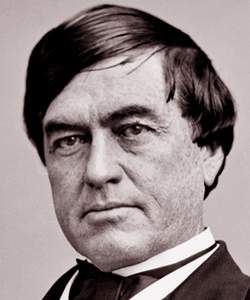Cassius Marcellus Clay (American National Biography)
Scholarship
During the depression that followed the panic of 1837, Clay's economic views prompted him to join the antislavery movement, which soon became his life's major work. Seeking to understand the ongoing depression, Clay developed an economic critique of slavery that some historians consider to be the most penetrating analysis of slavery produced by a southerner. Clay blamed slavery for the South's economic malaise, arguing that the inefficiency of slave labor prohibited the growth of industry and commerce in the South. Industrious free workers fled from the South, where manual labor was held in contempt. Artisans had difficulty selling their products to a population made up largely of penniless slaves. Clay gained national attention for his economic analysis of slavery, which he presented in a series of speeches, editorials, and pamphlets, the most famous of which was Slavery: The Evil--The Remedy (1843). Acting on these arguments, Clay led a campaign during the late 1830s and 1840s to retain a legislative ban against the importation of slaves into Kentucky…
[In the 1850’s Clay] gave financial support and armed protection to John G. Fee, who was building a network of abolitionist communities and churches in the mountains of Kentucky.
By these actions Clay restored his antislavery reputation among the conservative and moderate reformers who created the Republican party. Seeing Clay as an inspiration for building a southern branch of the party, early Republican leaders welcomed him into their highest national councils.
[In the 1850’s Clay] gave financial support and armed protection to John G. Fee, who was building a network of abolitionist communities and churches in the mountains of Kentucky.
By these actions Clay restored his antislavery reputation among the conservative and moderate reformers who created the Republican party. Seeing Clay as an inspiration for building a southern branch of the party, early Republican leaders welcomed him into their highest national councils.
Harold D. Tallant, "Clay, Cassius Marcellus," American National Biography Online, February 2000, http://www.anb.org/articles/15/15-00131.html.



